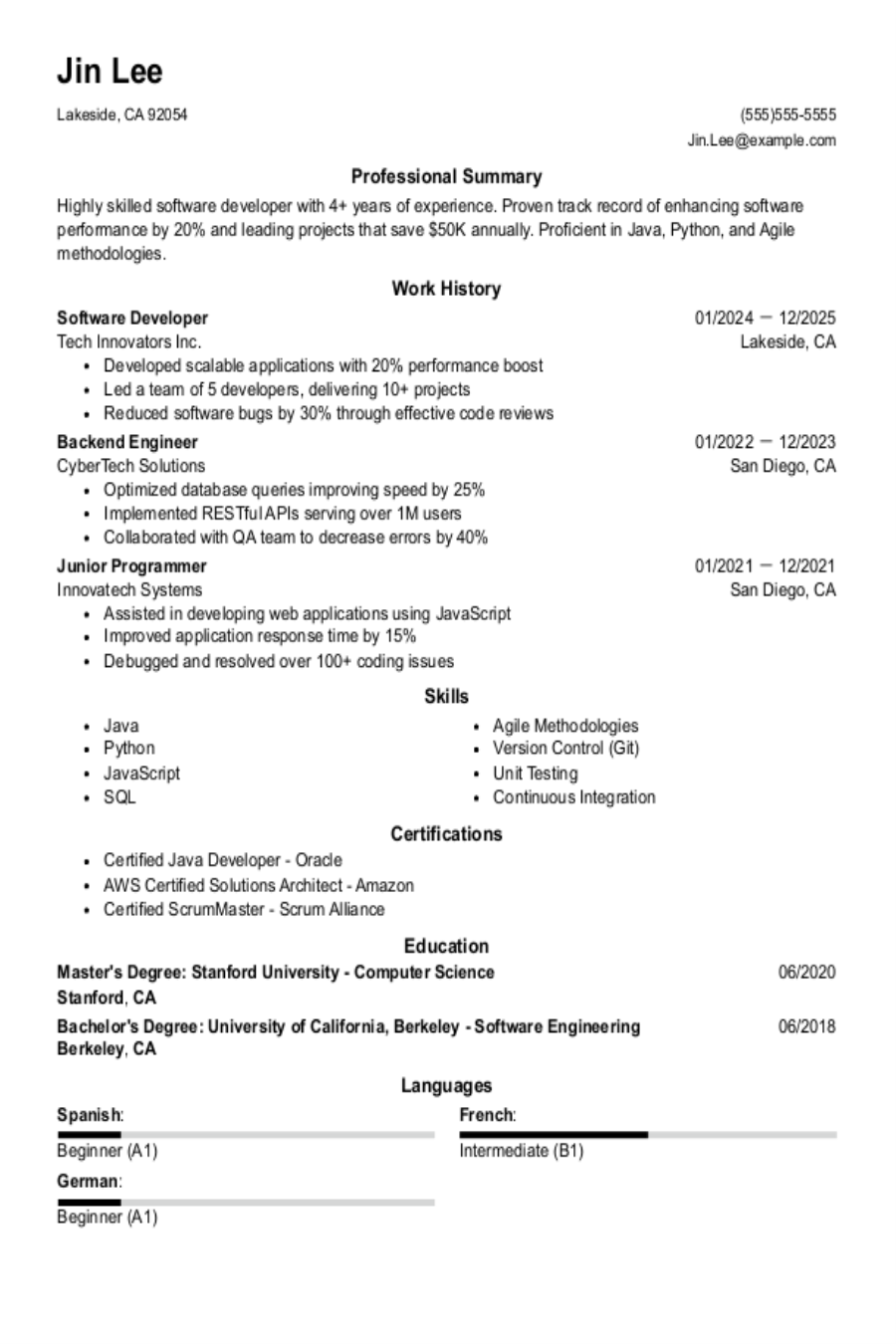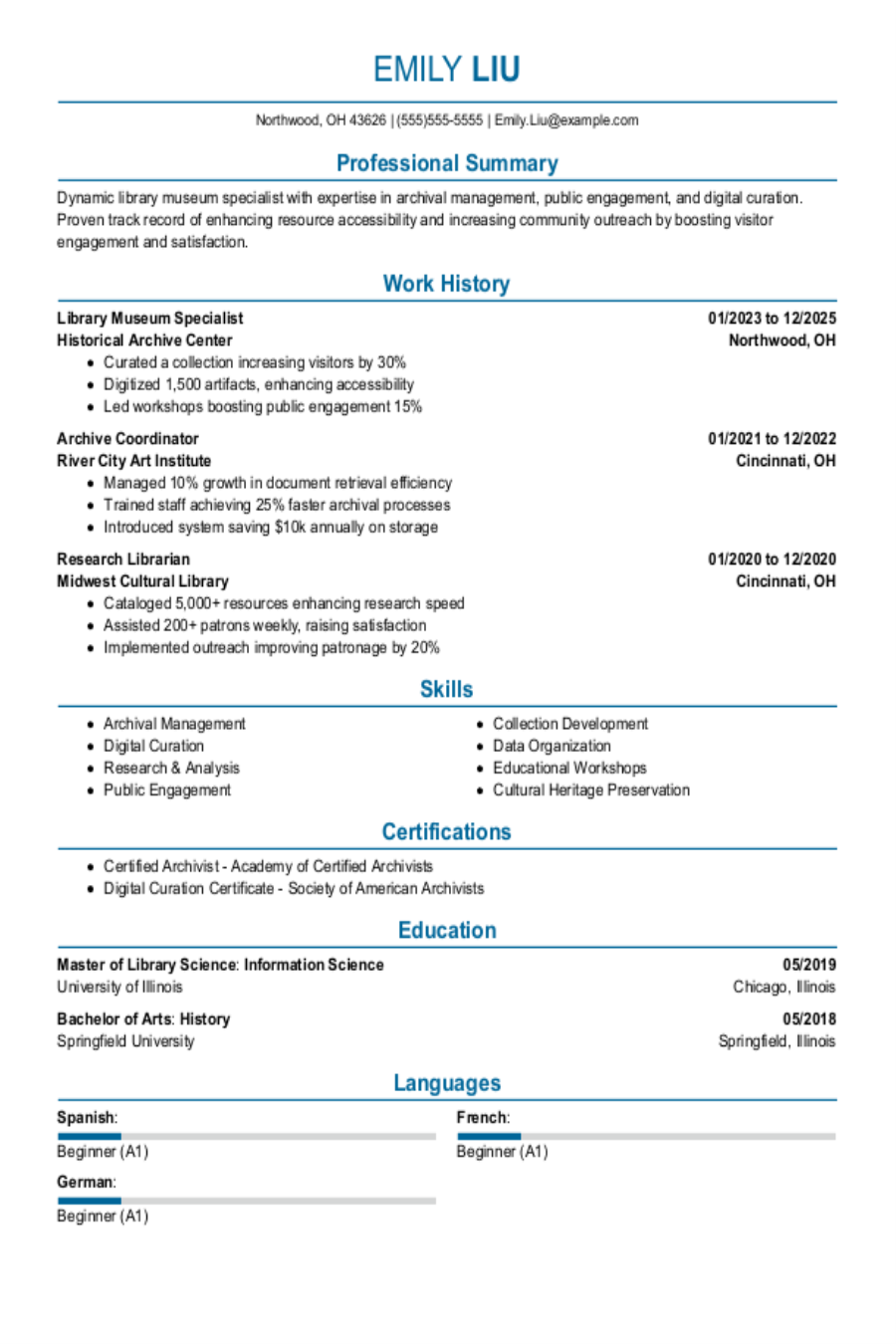Table of contents
Popular Civil Engineer Resume Examples
Entry-level civil engineer resume
An entry-level resume for a civil engineer should focus on relevant projects, internships, technical skills, and educational achievements to effectively showcase capabilities despite limited professional experience.
Focuses on goals: Sydney Morgan leverages advanced education and certifications to drive innovation in civil engineering, fostering professional growth through strategic project management and design excellence.
Places skills over experience: Using a functional resume format is strategic for this entry-level civil engineer, as it highlights relevant skills like structural design and project management over limited work history, showcasing their strong potential to employers.
Mid-career civil engineer resume
A mid-career civil engineer's resume should emphasize a strong combination of project experience, technical skills, and continuous professional development to demonstrate their capability and growth in the engineering field.
Encourages quick scanning: A well-organized layout highlights key qualifications, making it simple for hiring managers to quickly identify relevant experience and skills. Clean design improves readability, ensuring standout achievements are easily noted.
Employs active language: Using action verbs such as "led," "managed," and "designed" illustrates initiative and tangible results, highlighting a strong impact in civil engineering projects.
Experienced civil engineer resume
An experienced civil engineer resume should emphasize key projects and technical skills while clearly outlining professional growth and contributions to successful engineering solutions.
Optimized for ATS: The resume uses a clean and professional template that pairs an elegant header with an ATS-friendly resume format, facilitating easy navigation for both human reviewers and automated systems.
Quantifies achievements: Quantifiable achievements significantly improve the clarity of a civil engineer's contributions. By highlighting metrics such as project savings or compliance rates, recruiters can quickly grasp the impact of these accomplishments in real-world scenarios.
No experience civil engineer resume
A resume for an applicant with no experience in civil engineering should highlight relevant coursework, technical skills, and any projects or internships that showcase problem-solving abilities and a commitment to the field.
Overcomes lack of work history: Emphasizing skills in project management and structural analysis highlights the applicant's readiness for a civil engineering role, showcasing their capability to contribute effectively despite limited hands-on experience.
Draws from diverse experiences: Including extracurricular activities and volunteer experiences demonstrates this job seeker's commitment and practical skills, making a resume stronger by showcasing strengths beyond formal work experience.
Civil Engineer Resume Template
Looking for a solid foundation? Start with this civil engineer resume template, which you can easily personalize by adding your details and experiences.
Tao Liu
Chicago, IL 60601
(555)555-5555
Tao.Liu@example.com
Professional Summary
Experienced civil engineer with expertise in urban infrastructure, sustainable design, and project management. Proven ability to deliver cost-effective solutions, lead diverse teams, and achieve measurable results for complex engineering projects.
Work History
Civil Engineer
Urban Structure Solutions - Chicago, IL
September 2020 - September 2025
- Designed blueprints for 15+ infrastructure projects.
- Reduced project costs by 12% via optimized materials.
- Supervised teams of 25+ for site construction.
Structural Engineering Specialist
BridgeWorks Innovations - Chicago, IL
September 2018 - August 2020
- Enhanced load capacity by 25% for urban bridges.
- Coordinated 10+ cross-functional engineering efforts.
- Improved inspection efficiency by 30% using tech.
Infrastructure Design Consultant
MegaGrid Developments - Springfield, IL
September 2015 - August 2018
- Drafted urban drainage systems for 5 city districts.
- Reduced project delays by 20% with proactive reviews.
- Delivered cost-saving solutions worth $500K.
Skills
- AutoCAD and Revit proficiency
- Infrastructure planning
- Project management
- Sustainability design
- Cost estimation techniques
- Team leadership
- GIS mapping tools
- Risk assessment
Education
Master's Civil Engineering
Stanford University Stanford, California
June 2015
Bachelor's Structural Engineering
University of California, Berkeley Berkeley, California
June 2013
Certifications
- Professional Civil Engineer (PCE) - California Board for Professional Engineers
- Advanced Structural Design Certification - American Concrete Institute
- Project Management Professional (PMP) - Project Management Institute
Languages
- Spanish - Beginner (A1)
- Mandarin Chinese - Intermediate (B1)
- French - Beginner (A1)
Must-Have Skills on a Civil Engineer Resume
A strong skills section is essential for showcasing your qualifications in a competitive job market.
Technical and engineering professionals develop solutions that support innovation and operational strength. The skills you highlight should reflect your ability to contribute to complex projects and maintain quality standards. Your resume needs to show how you help drive progress and ensure reliable, effective results.
Our data reveals the most sought-after hard and soft skills for civil engineering roles based on extensive analysis of resumes submitted to Resume Now.
To improve your resume, try using our AI Resume Skills Generator. It can recommend tailored skills relevant to your title, enabling you to create a comprehensive and effective skill set.
Writing Your Civil Engineer Resume
Having explored these effective resume examples, you’re now prepared to dive into the specifics of how to write a resume. We will walk you through each component step by step, ensuring you understand what to include in every section.
List your most relevant skills
A strong civil engineer skills section should highlight both your technical abilities, like skill in AutoCAD or project management, along with essential soft skills such as teamwork and communication.
Incorporating keywords from the job listing into your skills section is important. These keywords not only help human recruiters see that you're a match but also ensure applicant tracking systems recognize you as a qualified applicant. Carefully study each job description to identify these terms, improving your chances of making it past initial screenings.
Example of skills on a civil engineer resume
- Proficient in designing and analyzing structures using advanced engineering software
- Experienced in managing construction projects from conception to completion
- Strong communicator who collaborates effectively with diverse teams
- Detail-oriented with excellent problem-solving and critical thinking skills
Including soft skills on your resume can set you apart from other job seekers. Employers value interpersonal abilities because they are challenging to develop and can significantly improve team dynamics and workplace culture.
Highlight your work history
Your work experience section should list your duties and showcase your achievements and the impact of your contributions. Highlight specific projects or initiatives where you applied key engineering skills, ensuring that each entry is filled with relevant keywords that demonstrate your capabilities.
When detailing each job, include critical information such as your job title, the name of the employer, and the dates you were employed. This information helps establish your professional credibility and gives employers a clear timeline of your career path. Remember to emphasize any significant accomplishments or contributions you made during these roles.
Example of a civil engineer work experience entry
- Civil Engineer
ABC Engineering Solutions - San Francisco, CA
June 2019 - Present - Designed and managed infrastructure projects, including bridges and highways, ensuring compliance with local regulations and safety standards
- Conducted site assessments and feasibility studies to evaluate project viability, resulting in a 30% reduction in unexpected costs during construction phases
- Led a team of 10 engineers and technicians on multiple projects, fostering collaboration and improving productivity by implementing agile project management practices
- Used advanced software tools for structural analysis and design, improving design efficiency by 25% while maintaining high-quality outcomes
- Presented project proposals to stakeholders, effectively communicating technical concepts which secured funding for three major initiatives totaling over $5 million
Quantifying achievements in civil engineering is essential to illustrate your impact on projects. For example, stating that you reduced construction costs by 15% through efficient resource management not only highlights your skills but also provides tangible evidence of your contributions to potential employers.
Include your education
The education section of your civil engineer resume should display your academic qualifications in reverse-chronological order, starting with the most recent degree. Include all relevant degrees and certifications while omitting your high school diploma if you hold a bachelor's degree or higher. This helps to maintain a professional focus on advanced education.
If you are currently enrolled in a program or have incomplete education, be sure to list your highest completed level along with an expected graduation date. You can also improve this section by including bullet points that highlight key coursework or significant academic projects that relate directly to civil engineering.
Common certifications for a civil engineer resume
- Professional Engineer (PE) – National Council of Examiners for Engineering and Surveying (NCEES)
- Certified Construction Manager (CCM) – Construction Management Association of America (CMAA)
- LEED Accredited Professional (LEED AP) – U.S. Green Building Council (USGBC)
- Project Management Professional (PMP) – Project Management Institute (PMI)
Sum up your resume with an introduction
Creating a strong profile section on your resume is essential for making a powerful first impression. It serves as your introduction, giving potential employers a snapshot of your qualifications and career goals.
If you have significant experience in civil engineering, consider using a professional summary to showcase your notable accomplishments. This format allows you to highlight key projects and skills that demonstrate your expertise right at the top of your resume. If you have limited experience, write a goals-focused resume objective that highlights your career progression and development.
Professional summary example
Accomplished civil engineer with over 10 years of experience in large-scale infrastructure projects. Demonstrated success in leading cross-functional teams, optimizing design processes, and improving project delivery timelines. Expert in structural analysis, geotechnical engineering, and sustainable construction practices, driving innovation and quality in all phases of development.
Resume objective example
Enthusiastic civil engineer eager to apply strong analytical skills and attention to detail within a progressive engineering firm. Aiming to use project management capabilities and creative problem-solving to improve infrastructure projects while fostering sustainable development and innovation.
When writing your resume profile, start with your job title as a civil engineer. This method helps employers swiftly grasp your professional identity and the value you offer, whether you're creating a summary or an objective statement.
Add unique sections to set you apart
Incorporating optional resume sections can highlight your unique qualifications as a civil engineer. These sections allow you to present a fuller picture of who you are beyond your technical skills.
By sharing relevant hobbies or volunteer experiences, you demonstrate values that resonate with potential employers. For instance, if you've volunteered for community infrastructure projects, it showcases your commitment to public service and teamwork. Additionally, including interests related to engineering can reflect your passion for the field and your continuous pursuit of knowledge.
Three sections perfect for a civil engineer resume
- Technical Skills: Technical skills are important for civil engineers as they demonstrate your ability to handle complex projects. Highlighting these skills on your resume shows potential employers that you have the expertise needed to succeed in this competitive field.
- Tools and Platforms: In civil engineering, computer skills in software tools are important. Highlight your experience with CAD programs, project management software, and simulation platforms to showcase your ability to design and analyze complex structures effectively.
- Professional Certifications: Certifications showcase your dedication to staying updated in the engineering field. Highlight relevant technical certifications, including the certifying body and date achieved, to improve your credibility and career prospects.
5 Resume Formatting Tips
- Choose a format that matches your career stage.
Choosing the right resume format is important for showcasing your experience. If you have extensive civil engineering experience, go with a chronological format to highlight your career progression.
For those just starting out, a functional resume can help emphasize your skills and education instead of work history. Consider a combination format if you want to showcase both effectively. - Pick a smart resume template.
Using a professional resume template can greatly improve the readability of your document. It allows you to present your information clearly and concisely. If you prefer to format your resume manually, keep it straightforward and ensure it is compatible with applicant tracking systems by using standard fonts.
- Select an appropriate font.
Choose a clean, professional font to improve your resume’s readability. Fonts like Helvetica, Georgia, or Verdana are effective for both applicant tracking systems and hiring managers.
- Use consistent formatting.
Align your resume to the left with uniform margins to create a polished and professional look that stands out to potential employers.
- Keep your resume to one or two pages.
When crafting your resume, remember that resumes should be one page long, particularly if you are in the early stages of your career. Keep it concise and highlight only the most relevant experiences that showcase your skills and accomplishments.
What’s the Average Civil Engineer Salary?
Civil engineer salaries vary based on location, career level, and qualifications.
This data, provided by the Bureau of Labor Statistics, will show you expected salary ranges for civil engineers in the top 5 highest-paying states, including the District of Columbia. The figures reflect the most current salary data available, collected in 2024.
- Full Range
- Most Common (25th–75th percentile)
- Average
California
Most common: $94,450 - $145,730
New York
Most common: $82,660 - $135,880
Rhode Island
Most common: $80,870 - $145,700
Massachusetts
Most common: $83,250 - $130,080
Mississippi
Most common: $77,110 - $146,930
Tools for Your Job Search
Are you gearing up to apply for that civil engineer position you've had your eye on? Before you hit send, consider using our ATS Resume Checker. This valuable tool provides insights into how well your resume aligns with the automated systems many engineering firms use for initial applicant screening.
Looking to elevate your application further? Our AI Resume Builder offers tailored content recommendations specific to your civil engineering background, alongside professionally designed templates that highlight your technical skills and project experience effectively.
Frequently Asked Questions
Last Updated: September 30, 2025
Absolutely. A cover letter is important as it provides context to your resume and establishes a personal connection with the employer. It’s your chance to articulate why you are passionate about the civil engineering role and demonstrate how your background makes you an ideal job seeker. So, don’t hesitate—write a cover letter that improves your application.
For a quick and effective solution, try our AI Cover Letter Generator! It allows you to create a customized, job-winning cover letter in minutes. Plus, you'll find various cover letter template options that align perfectly with your resume, ensuring a consistent and professional presentation of your qualifications.
A CV (curriculum vitae) is generally more extensive than a resume, often spanning several pages to include in-depth information about your academic history, research projects, publications, and professional experiences. In contrast, resumes are concise documents that typically cover just one to two pages.
You should use a CV when applying for positions in academia or specialized fields such as law or medicine. If you think a CV is the right choice for your next application, our online CV Maker is at your service! It offers a variety of CV templates designed for different industries and career levels, making it easy to create a tailored document quickly.
Selecting the right resume format hinges on your experience and strengths. Inexperienced job seekers often find success with a functional format, which highlights relevant skills over work history. Conversely, seasoned professionals benefit from a chronological format that showcases their career journey and accomplishments. For those in mid-level positions, a combination format serves as an effective middle ground, presenting both skills and professional experience in a balanced manner.
A frequent resume mistake civil engineers make is not tailoring their resumes for ATS. To improve your chances, use a resume template is Ats-friendly and customize your content to align with the specific job description. This approach ensures your qualifications are highlighted effectively and increases the likelihood of passing through initial screenings.
As a civil engineer, showcasing your dedication to professional growth is essential. You can do this by acquiring and listing relevant certifications. Additionally, highlight any courses you've completed, seminars you've attended, and books or podcasts that have influenced your work. Being an active member of industry associations also illustrates your commitment to staying informed about the latest developments in your field.
Was this information helpful? Let us know!
Leisha is a career industry editor dedicated to helping job seekers excel in their careers.
More resources

The AI Boss Effect: 97% of Workers Have Asked ChatGPT for Advice Instead of Their Manager
Resume Now s latest report explores how AI is replacing manage...

37 Unique Skills to Put on Your Resume
Trying to avoid the skills you see pop up on resumes repeatedl...

Resume Now Spotlights 14 High-Innovation, High-Growth Jobs That Pay $60K+
Resume Now s latest report highlights some of the highest payi...




